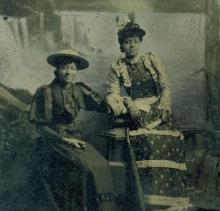This talk employs the lens of Afrofuturism to address new dimensions of the Underground Railroad, detailing what imagination, tact, and technology, it took for fugitive Blacks to flee to the “outer spaces of slavery.” Runaways revealed the inner workings of their intelligence with each day they were away. Escaping slavery brought dreams to life, and at times must have felt like “magical realism,” or an out-of-body experience, and the American North, Canada, Mexico, Africa, Europe, and free Caribbean islands were otherworldly and science fiction-like, in contrast to where Black fugitives had ascended.
Historians, too often, have focused on the one-way flow of fugitives on the Underground Railroad from America to Canada when in fact the situation on the ground was far more fluid, involving two-way movement and social collaborations. This lecture will highlight Rochester, New York, and St. Catharines, Canada West, the last stops on the Niagara branch of the Underground Railroad to demonstrate that its Black residents each possessed transnational identities and strategically positioned themselves near the American-Canadian border where immigration and interaction occurred. In all, this lecture will reveal two disruptive innovations to the way Blacks are studied in the early nineteenth century by using the means of Afrofuturism and new age borderland approaches.
dann j. Broyld is an associate professor of African American History at the University of Massachusetts Lowell. He earned his PhD in nineteenth-century United States and African Diaspora History at Howard University. His work focuses on the American-Canadian borderlands and issues of Black identity, migration, and transnational relations as well as oral history, material culture, and museum-community interactions. Broyld was a 2017–18 Fulbright Canada scholar at Brock University and his book Borderland Blacks: Two Cities in the Niagara Region During the Final Decades of Slavery (2022) was published with the Louisiana State University Press.
The Johanna and Leon Katz Memorial Lecture has been generously endowed by the late Johanna Sedlmayer-Katz.
